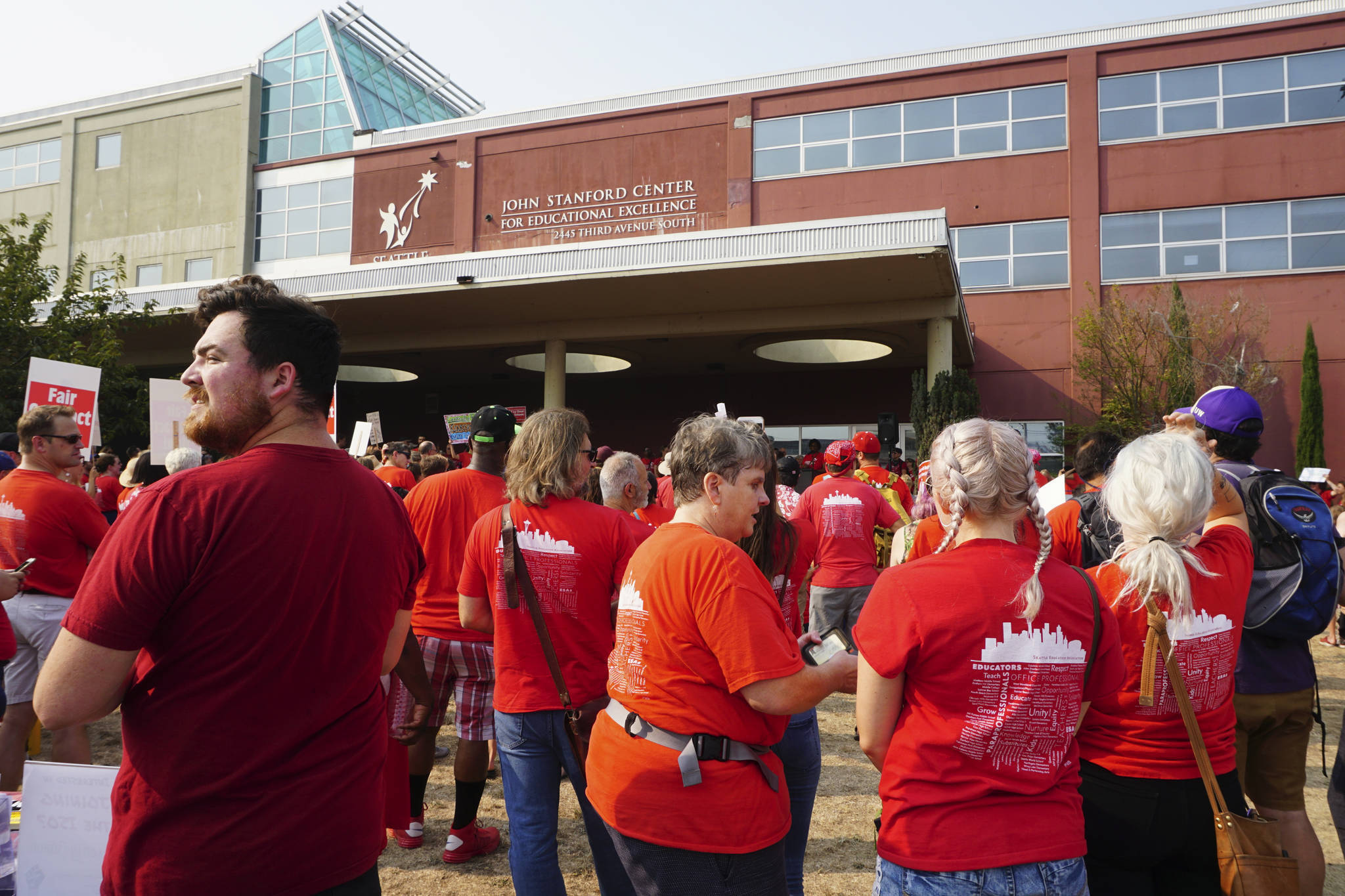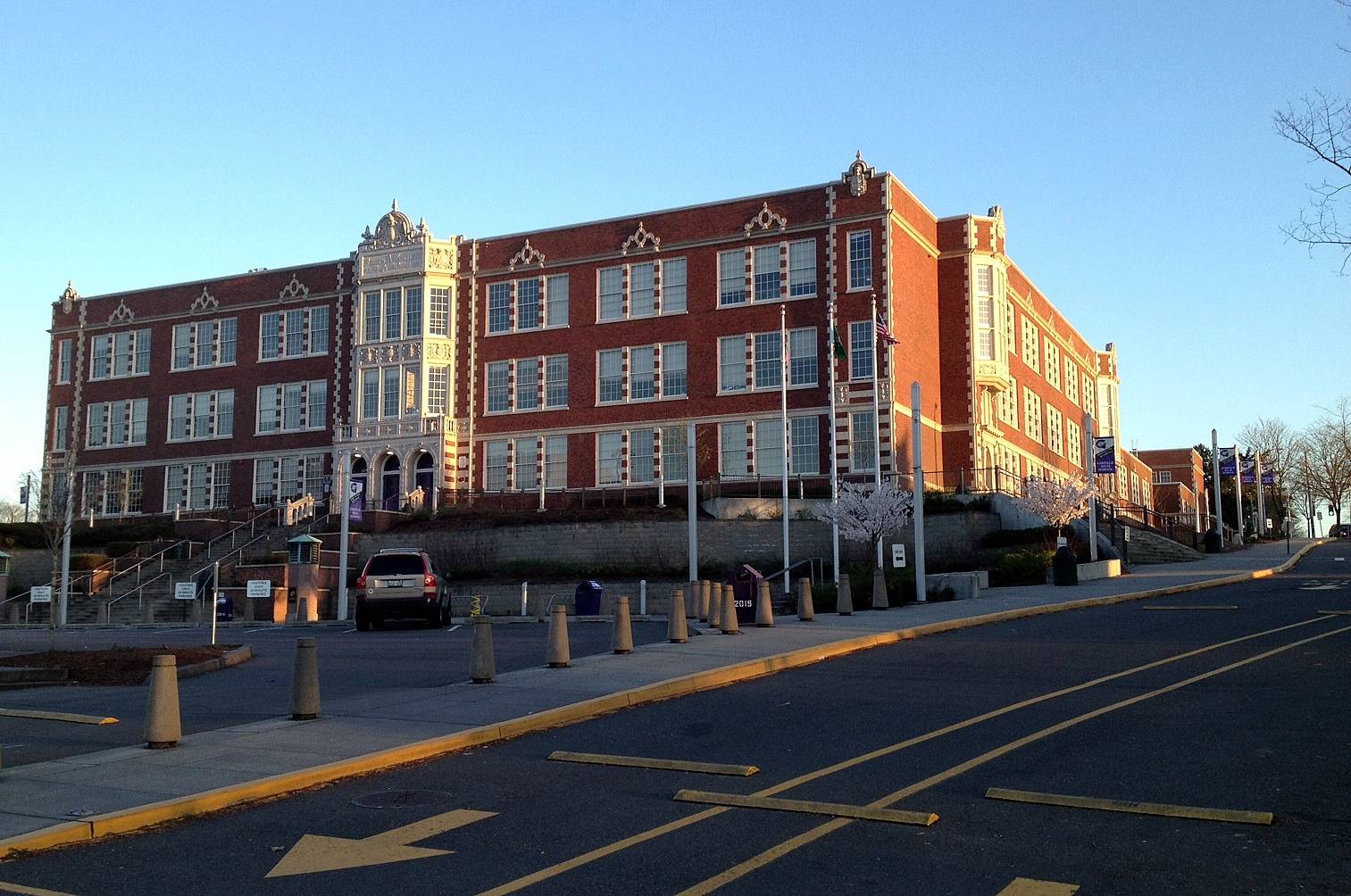After threat of a possible strike, the Seattle Education Association (SEA)—a union that represents more than 5,000 teachers and other school employees—came to a tentative agreement with the local school district late Friday. SEA members will vote on the tentative contract agreement on Sept. 8. In the meantime, school will resume on Sept. 5 for 1st through 12th grades; kindergarten classes will start Sept. 10.
The tentative agreement announced on Friday evening followed the union’s strike-authorization vote on Aug. 28, in which members resoundingly agreed to picket if an agreement wasn’t made with Seattle Public Schools (SPS) before the first day of school on Sept. 5. Educators and school officials were at odds over raising teacher salaries following changes to the school funding system.
Although SEA members have not yet seen the tentative contract agreement, they will vote to approve it at Benaroya Hall on Sept. 8. Educators will receive at least 72 hours to review the tentative contract before voting, according to the union’s bylaws.
Yet some SEA members have already decided they will not approve the tentative agreement next Saturday, citing inadequate raises and paid parental leave, among other concerns.
The tentative agreement will offer a 10.5 percent pay increase for all educators and five days of paid parental leave, according to an email sent from SEA officers to union members Saturday that was forwarded to Seattle Weekly. SEA reached an agreement with the school district to extend the current contract to Sept. 9, the email added.
Connor Lee, a special education assistant at Louisa Boren Stem K-8, is one SEA member who said that he won’t vote for the tentative agreement. On Sept. 4, Lee told Seattle Weekly that he finds some of the details he’s gleaned from the tentative agreement “concerning.” He had hoped for a 15 percent wage increase, and noted that entering teachers would still make $10,000 less than those in Shoreline even with the suggested 10.5 percent raise.
“We’re shooting ourselves in the foot if we’re only giving a 10.5 percent raise increase because doing so will not allow us to retain or recruit good educators in Seattle in comparison to other districts in the region,” Lee said.
SPS teachers’ salaries range between $50,604 and $100,763 under the current contract. According to statewide teachers’ union Washington Education Association (WEA) data, teachers on Bainbridge Island negotiated a 21.2 percent wage increase to earn between $53,905 and $105,096; meanwhile, Shoreline’s union secured salaries ranging from $62,088 to $120,234 through a 24.2 percent wage increase.
Educators sought higher wages after state lawmakers added $776 million to the state budget for teacher salaries statewide. The additional funding was designed to help settle a nearly decade-long battle in state government over public-school funding stemming from a consequential court ruling known as the McCleary decision. In 2012, the State Supreme Court found that the state was underfunding the K-12 school system, and demanded an end to reliance on local property taxes to fund basic education.
As a result, the state will allow SPS to collect only $2,500 per student annually through the voter-approved local education levy—$1,500 less than previous years. In an early August budget update, SPS cited the lawmakers’ plan to settle the McCleary lawsuit as the cause for a projected budget shortfall and potential staff downsizing.
However, SEA maintained that the districts had enough money to increase educators’ wages, and were willing to picket to guarantee it.
SPS officials posted two versions of a statement announcing the tentative agreement late Friday, later replacing a more elaborate version with a less detailed one. The first statement ensured “a competitive pay schedule that will not only honor the work of our current educators, but help us attract and retain new professionals to Seattle Public Schools.”
Although the specific details were absent from the district’s original statement, it ensured that a tentative agreement would include enhanced health-care benefits for substitute teachers, as well as increased nurses and secondary counselors. Race and Equity teams also will be expanded throughout the district, and more professional development opportunities will be available to teachers and other district staff members.
If approved by union members, the tentative agreement will prevent the second strike in less than five years. Contract negotiations between SPS and SEA stalled in 2015, when the district and union disagreed on teacher pay. The five-day strike affected 50,000 students and sent parents scrambling to secure child care.
SPS sought to avoid such a disturbance through interest-based bargaining that began in May, and strove to find a mutually beneficial agreement.
However, Lee said that he will not approve a tentative agreement that doesn’t guarantee health care for substitute teachers. “Substitutes should get health care, full stop. They work often times the same number of days as I do,” Lee said, noting that most of them don’t receive employee health care. He also disagreed with the tentative agreement’s proposed five days of paid parental leave, saying that he’d hoped the contract would guarantee at least six weeks.
SPS officials maintained that their bargaining sought a compensation package that would benefit instructors and maintain critical programs for students.
“One priority issue during negotiations has been educator compensation. We believe our educators and support staff deserve a competitive, fair salary package and as a district we want to be able to attract and retain the very best educators for our students,” SPS officials wrote in a statement announcing the tentative agreement. “We value our incredible educators and look forward to a great first day!”
mhellmann@seattleweekly.com
Sep. 4 Update: The story has been amended to include details from a Sep. 1 email to SEA members. It also includes quotes from Connor Lee.









